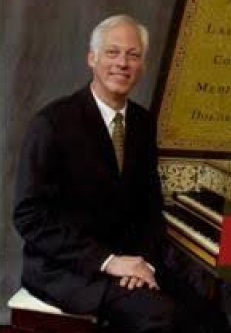 Sunday, November 10, 2019, 2-4pm
Sunday, November 10, 2019, 2-4pm
Reed College, Portland
Though we think of music mostly in the context of performance today, much of music making in the past happened in the most private spaces of the home, where composers could take refuge from the pressures of employment and commissions by letting their innermost thoughts take musical flight. J.S Bach took to the clavichord at the end of the day to play spontaneous keyboard transcriptions of his works for unaccompanied strings. Girolamo Frescobaldi reinvented the rich world of the madrigal into a language for the fingers. William Byrd spun brilliant essays in musical imagination over simple harmonic patterns. Each of these composers left a legacy of music that invites us along on their flights of fancy.
On the afternoon of Sunday, November 10 around 30 early keyboard enthusiasts gathered at Reed College to attend a recital of clavichord and harpsichord music performed by Michigan-based Dr. Gregory Crowell. He spent the first half of the concert playing the clavichord, and the second half of the concert playing harpsichord and a virginals. All instruments are part of the Reed Early Keyboard Collection.
The clavichord part of the program included an extemporized prelude, one created there on the spot, a deep nod to the past when this sort of thing was common among keyboardists. This was followed by JS Bach – the Preludio from Partita for Unaccompanied Violin No. 3 (BWV 1006), transcribed for keyboard.
The remaining clavichord work was the Suite in C Minor for Unaccompanied Cello (BWV 1011), also transcribed for keyboard. The Suite consists of a Prélude, Allemande, Courante, Sarabande, two Gavottes with a da capo, and Gigue.
It was wonderful to hear a player bring out all sorts of colors and expressivity from the instrument, a large unfretted clavichord built by Paul Irvin. The second Gavotte was particularly delightful with its unrelenting and quick passagework. At times the clavichord almost sounded like a plucked instrument, the sound having such an immediate focus. As it happens with clavichord concerts, the listener eventually arrives in an “aural altered state” and ambient sounds become crashingly loud, while the clavichord sounds at a perfectly normal decibel level. Love it or hate it, it’s pretty amazing.
There was a lovely reception at intermission – good coffee and a selection of full-sized pastries. Everyone was out in the lobby having a delightful time enjoying solid refreshments and chatting amongst themselves.
The harpsichord half of the program featured an Italian harpsichord built by Salem-based builder Owen Daly, and an Italian Virginals by Reed alumna Chloe Lewis. Dr. Crowell made a point to highlight and credit the builders, two of the three (Paul Irvin, Owen Daily) being there in the room. The audience gave them a round of applause.
The first piece was Toccata Settima (Book I, 1637) by Girolamo Frescobaldi. The Italian harpsichord had the most perfect sound for this piece, with a clarity to it that was almost addictive to the ear.
Following that was the Canzona Quarta: La Pace by Giovanni Paolo Cima, played on the virginals.
As an aside: the Italian harpsichord and virginals were each tuned in a different version of meantone. Dr Crowell went between the two depending on the keys that worked best on the individual instruments.
And because the tuning was in meantone, its natural dissonance was a spectacular addition to the modern piece Wardie’s Dump by James Woodman (b. 1958). Dr. Crowell explained to us that a “Dump” was a piece meant to cheer one up from being sad or blue, i.e. “in the dumps.”
Finally, he performed a Pavana and Galiada and My Ladye Nevels Grownde by William Byrd on the Italian harpsichord. Again, the clarity of the sound of the Italian harpsichord plus Dr. Crowell’s focused and accurate playing elevated these pieces, and it was easy to take great pleasure in hearing this music.
Thanks to Gregory Crowell for such an excellent afternoon of music, and to all who attended Sunday’s performance. We look forward to seeing you at our next concert at Reed College on Saturday, February 15, 2pm – All My Children: the Bach Legacy with Julia Brown, harpsichord.
Gregory Crowell has appeared internationally as organist, harpsichordist, clavichordist, lecturer, and conductor, performing in many festivals and conventions, including the American Guild of Organists and Organ Historical Society conventions, the Boston Early Music Festival, the Saugatuck Chamber Music Festival, the Fontana Chamber Music Festival, the Boston Clavichord Society, the International Clavichord Symposium , and meetings of the Southeastern and Midwestern Historical Keyboard Societies. Particularly noted for his performances of the keyboard works of Johann Sebastian Bach, Crowell has been a featured performer at the Weener (Germany) International Bach Series, the Grand Rapids Bach Festival, the Old West Organ Society (Boston) Bach Marathon, and the Valparaiso Bach Institute.
Broadcasts of Gregory Crowell’s performances have been heard on numerous radio programs, including NPM’s Pipedreams, and his compact disc recordings include live organ performances on the OHS label. Crowell’s solo performances have been described as “beautiful, flexible, expressive” (The Diapason), “full of panache and expression” (Ostfriesen Kurier), “reliable as a sunrise, steady as a rock, especially in the virtuoso finale” (The Grand Rapids Press), and “this listener cannot recall ever having heard better” (The Boston Herald).
Crowell has also published widely on subjects related to early keyboard instruments and their repertoire and is the current editor of Clavichord International. Dr. Crowell serves as University Organist and Affiliate Professor of Music General Education at Grand Valley State University, and Director of Music at St. Mark’s Episcopal Church in Grand Rapids, Michigan.